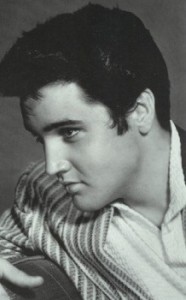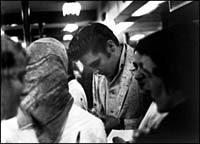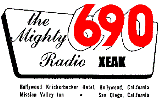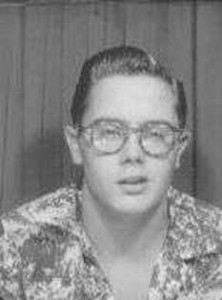from Passing Trough
LONG LIVE THE KING - ELVIS
The first time I ever heard Elvis was on The Mighty 690, a station referred to as a border bandit blasting out the hits from Mexico. “That’s alright Mama, that’s alright with me”, it was a voice all by itself, I had never heard one like it before or since. The name of the disc jockey was lost in the excitement as he announced something about “western music’s new heart throb is a repeat treat” with the record again pulsating through the night time sky into my car’s radio. With the top down I turned up the volume to share with others cruising Colorado Boulevard. The guitar grabbed and pulled me into the song “That’s alright mama”, singing along to the point that I didn’t get the name of the singer as the song faded out and the DJ teased, it was the nights most requested record. At this early stage he referred to the singer as coming from “western bop”.
Turning on my radio the next day, there it was again and this time my ears captured the name of the singer, but I wasn’t sure I heard it right. It was a strange name, not at all like those I heard before. Elvis who? the last name again escaped me. Even though I didn’t own a record player I wanted to hear this song again and again. A few days later I inquired to the clerk as I entered Wallichs Music City, had he ever heard of a record by Elvis somebody. Without saying a word he pointed to a stack of 45’s in a bin right by the cash register. Picking from the container I headed to the listen booth before being stopped in my tracks by the clerk asking for the record back and handing me one with worn grooves that had obviously been played over and over many times, then motioned me to advance toward a booth that was open. As I proceeded, I could hear “That’s alright Mama” coming from occupied booths as I passed. Sixty nine cents later, I was heading out the door with my first Elvis record, glancing to see the last name…Presley….Elvis Presley.
It wasn’t long before I began to hear Elvis on several stations. His gyrations, greasy hair style including long sideburns and even his clothing was sparking debate. He was a rebel pictured on a motorcycle, certainly not what ones parents could accept. DJ’s said Elvis was even more outrageous on stage than Johnny Ray, who captured attention as the “cry boy” by laying on the stage to sing “Cry” and “Little White Cloud That Cried”. I wanted to see this Elvis for myself, even more so after Jackie Gleason, someone parents looked up too, was quoted as predicting big stardom for him.
In the spring of 1956 I was excited upon learning Elvis would be appearing at the Long Beach Auditorium and within days my friend Maurice was able to secure tickets as he also wanted to see this phenomenon. Appearing the night before at the Shrine Auditorium the radio was Elvis-ized all that day with a constant airing of “That’s alright Mama”, “Blue Suede Shoes”, “Heartbreak Hotel” “Blue Moon of Kentucky” and even his version of Bill Haley’s “Shake Rattle and Roll”.
As a kid I remember seeing news coverage of Frank Sinatra being mobbed by fans. Without the arrival of television, we relied on newspaper and radio and the Movietone News, the weekly rundown of news events that preceded the main feature at our local motion picture theatre. Bobby Soxers, those teenage girls who wore white socks doubled up at the ankle, just above the shoe, were crazy over their “Frankie”, as they swooned to his mellow voice. I was about to experience the same thing, only this time it wasn’t jitterbugging or the bunny hop, it was the explosion of something to be called rock n’ roll.
Traffic was backed up as we approached Long Beach, making us late for the start of the show. Approaching the entrance of the auditorium we could see several dozen teenage girls reacting to the action inside the building.
The show was sold out and several rushed us asking if we had tickets. We hurried past them and entered to the roar of several thousand fans screaming for all they were worth. Elvis was on stage and I could just barely make out the words of the song, “I got a woman, mean as she could be”. I stood in amazement as Elvis’ every move created even more of a crescendo of screams that challenged my ability to actually hear him.
As he sang those songs already etched in our minds by radio, I began to realize I was actually having a very special experience. The excitement of California to me was overwhelming. Burt Lancaster, Errol Flynn, June Allyson, Andy Devine, David Nevin and now Elvis Presley, it was more than I could have possibly imagined. As the show ended, we headed to find our car in the parking lot and were disappointed that it had a flat tire. Even this would turn into a special moment as Maurice said he was going to walk to a nearby service station for assistance in changing the tire, he suggested I sit in the car and wait for his return.
Time passed, with the parking lot now empty and still no Maurice. I listened to the radio for awhile and finally decided to return to the entrance of the auditorium to see some of the Elvis postures on display in the windows. Doing so I turned to return to the car just as a light colored car crept by…with Elvis sitting in the passenger side of the front seat. I nodded hello as he raised his hand in greeting and continued on his way. I was just ten feet from the man everyone was talking about. I couldn’t wait to tell Maurice.
Eisenhower years were tame with black and white television just beginning to mirror the lifestyle of the nation, for those who could actually afford one. This new marvel was bringing the stars of radio to TV screens featuring Jack Benny, Lucille Ball, Bob Hope, George Gobel and Red Skelton. Arthur Godfrey’s Talent Scouts, refused to approve Elvis for competition and although Jackie Gleason was first to give exposure to him, most attention would come when Milton Berle braved the criticism to give Elvis his first major television appearance.
Overnight everyone was talking about him. Shocked parents were appalled when their daughters chose Elvis over a more acceptable Pat Boone. Besides, they found it difficult to even understand the lyric’s of Elvis’ songs. They prayed this fad would surely not last very long, as most radio stations refused to give Elvis records any play, or if they did it would be limited to night time when parents were exploring television.
Greasy hair, curled lip, what young man didn’t attempt to be either Elvis, James Dean or Marlon Brando? They were the role models of the mid-50’s.
Ministers preaching the word of God were certain Elvis was the devil and expressed concern he was “a white man who sounded like a nigger”. Racism was rampant with Nat King Cole being one of the very few blacks acceptable to a white audience.
Amos and Andy, two white men who painted their faces with black make up, were advancing from radio to television thanks to their still huge popularity. Unable to afford a television set myself, I missed viewing Elvis until his appearances on the Steve Allen and Ed Sullivan shows.
The Santa Monica Sears store where I had been employed earlier, allowed some employees with privileged guests to a viewing after closing hours. Picking up where I left off with my friend Sara, I accepted her invitation to watch Elvis on the Steve Allen show and two weeks later his appearance on Ed Sullivan.
Known as the great stone face, Sullivan competed with Steve Allen for television audience. Pleasing his largely conservative adult audience, Sullivan promised Elvis would never appear on his prime time Sunday evening show. Steve Allen, who aimed at a more youthful audience, snared Elvis and most of the viewers as he and Colonel Tom Parker embarrassed Elvis when he was made to appear singing Hound Dog to an actual hound dog. Feeling the sting of defeat, Ed Sullivan reached deep inside his talent budget and after agreeing to pay an unheard of $50,000, suddenly announced Elvis would after all appear on his show, but only televised from the waist up.
After Long Beach, several years would pass before I once again would see Elvis in person. Our lives took many turns, Elvis’ mother passed away and drafted into the army he would be stationed in Germany. He met his future wife Priscilla there and completing his obligation in the service of his country he returned home to Graceland in Memphis. Priscilla would follow and in time they would marry in a Las Vegas ceremony, with a daughter, Lisa Marie, arriving nine months later. I didn’t know then that we would actually compare the similarities in our lives at a future date.
Headlining in Las Vegas, Elvis’ opening show at the International Hotel would be a major event for a celebrity packed audience. My being responsible for programming at WLS in Chicago, I lucked out when RCA included me with an invitation to attend the sold out event of the year. Not to be outdone, Columbia records immediately surfaced inviting me to see Barbara Streisand who was preceding the Elvis opening at the same hotel in Las Vegas. Declining the offer, a few days later it was increased to include a luncheon with Barbara.
Unfortunately, the only open date was two weeks before Elvis’ opening and I would foolishly make the excuse that July in Las Vegas was too hot for an extended stay. Hearing of the Streisand invitation, RCA countered with the offer of a luncheon with Elvis’ manager, Colonel Tom Parker. My embarrassing youthful arrogance declined unless Elvis himself would also be at the luncheon. While they were attempting to find out Elvis’ availability I informed the boys at RCA my reservations had already been made with plans of going to Los Angeles first to visit my friends, Bill Drake, Bob Skaff and Eddie’s mother, Alice Cochran in Buena Park.
On July 31, 2023 the spectacular show opened to the music of the Strauss’ Also Sprach Zarathustra, aka the theme from Stanley Kubrick’s 2001: A Space Odyssey, bringing the star studded audience to a quiet attention in anticipation of what would lie ahead. This night was scheduled for just a choosen few, it was the night before Elvis’s official opening in Las Vagas. We would witness one of those moments that would never be forgotten as Elvis entered the stage wearing an all white outfit and a silk lined cape sparking with jewels. He was at his best and as I recalled that night of a dozen years ago in Long Beach, I beamed in pride as I felt I was watching an old friend who had survived, finally to be crowned King. Elvis was again on top, something few American performers did following the British invasion a few years earlier.
Besides performing those songs of so long ago, Elvis added at least two dozen more of his trademark hits of more recent years. “All Shook Up”, “Jailhouse Rock” and “Memories” hypnotized the audience before he dipped into his version of Beatle hits, “Hey Jude” and “Yesterday”. “Love me Tender” and “Are You Lonesome Tonight” melted the hearts of many before Elvis brought them to their feet with a tribute to Ray Charles with “What’d I Say”. “Suspicious Minds” would never be forgotten as the Sweet Inspirations joined Elvis into making it a haunting memory.
He rocked Chuck Willis’ “CC Rider” adding Simon & Garfunkle’s’ “Bridge Over Troubled Water”. Most eyes glistened as this man of the south sold “Dixie” as his own anthem. Looking around the room I witnessed a sea of show business celebrities standing. Among them, Dick Clark, my friends Paul Anka and Petula Clark, offering ovation after ovation and begging Elvis for just one more song.
All good things must come to an end, as did this event that will live in the minds of the lucky few who witness it. Elvis would repeat in the days ahead, luring the biggest crowds ever to the desert as he broke all previous records of attendance to the gambling capital. Long live the King.
Five years later, living in California, I consulted more than a dozen radio stations nationally when I received a call from a long time friend in the record industry who was then a major management figure at RCA Victor. We had known each other starting when I was a disc jockey in Denver and music director of KTLN.
Over the years we kept in touch as his career advanced from that as a promotion man to heading up the label. Asking if I would like to meet him for lunch and then go with him to drop off something for Elvis at his house, I answered “sure, where do you want to meet”. On the way to the restaurant my thoughts returned to those days almost twenty years earlier when the name Elvis first entered my head.
By now in my career I had met celebrities to the point I had grown used to meeting, indeed counting several as friends. However, on this day as I aimed my Mercedes down the freeway on the 30 minutes drive to this Hollywood luncheon I could feel butterflies in my stomach. I was actually going to meet Elvis. Arriving at the prearranged location, my friend from RCA pulled in right behind me as we greeted each other leaving our cars with the valet and entered the eatery.
Having dispensed with the pleasantry’s of asking about each others family’s I inquired of the purpose of the Elvis meeting. It was something about a Grammy Elvis was either being considered for or had already been awarded which brought me to further question why Elvis had never done a world tour, always limited to appearances here in the United States.
I learned that apparently Elvis’ manager, Colonel Tom Parker had great concern about traveling internationally because he was an illegal alien according to my friend. His fear of not being allowed to return to the states prevented him from opening the door to international travel.
My friend told me the colonel, addicted to cigars, had come from Germany and was paralyzed with the fear this information be made public. This man who was almost as well known as his protégée had managed Eddie Arnold, known as the Tennessee Plowboy a Nashville legend in country music before meeting Elvis.
It was alleged the old Colonel was in debt to the Las Vegas casino’s for big gambling losses and, according to my informant, Elvis had been working off the debt with his appearances at the International Hotel. There was even some discussion concerning death threats made to Elvis by the Las Vegas mafia.
As we departed the restaurant in my friend’s car, he explained that security around Elvis was very tight and while he had not informed anyone he was bringing a friend along, It may cause some concern and don’t be surprised if he at the last minute was prevented from introducing me to Elvis.
Arriving at the location, my friend asked me to remain in the car while he would see if it was alright for me to join him. Disappearing from my view I glanced around to see if I could see a security detail, spotting none I searched for a security camera, again none were sighted. Within a few minutes, my friend came into view once again motioning for me to join him as we entered the house and he closed the door.
At the same time I could see Elvis coming down a flight of stairs heading toward us. Dressed casually in dark pants and a satin blue or purple long sleeve shirt he shook hands with my friend and turned to do the same with me, saying “Hi, I’m Elvis”.
Although he was wearing tinted glasses, there was certainly no doubt who he was and I attempted a confident handshake and stuttered, “Really!” Elvis was not as tall as I expected and his cheeks seemed puffy as I heard him explaining that he was having some eye trouble and had to wear dark glasses inside.
As my friend opened a large envelope containing an award of some kind, handing it to Elvis, I was introduced as “one of the top radio guys” in the country, prompting Elvis to ask if I knew George Klein. I replied that I had never met George but certainly knew of him as a celebrated disc jockey at WHBQ in Memphis.
“Are you from here” he asked, I answered, “no, I’m a Buckeye with stops in Denver, Chicago & Pittsburgh before moving here to Northridge.” Any feeling of being uncomfortable was gone as he explained he had never been to Northridge but thought he was scheduled for a Pittsburgh appearance in the not to distant future. I brought up the fact that our mothers had the same name of Gladys, we both had daughters who were being raised by their mothers.
A slight frown formed above his glasses as the look of sadness came upon his face when he asked if my mother was still living. As I told him my mother passed away several years earlier, Elvis leaned toward me without standing, extending his hand to shake mine once again, shook his head in agreement and said, “I’ve been there”.
We also traded comments about two mutual friends, Sharon Sheeley and Tom Jones.
Sharon was a close friend of mine, having written several big hits in the mid 50’s including “Poor Little Fool” for Ricky Nelson and I was responsible for presenting Tom Jones, ten years earlier, on his very first appearance in this country.
Elvis said Tom had become a close friend visiting Graceland and they “hung out a lot in Vegas.” Sharon, Elvis said, was a good writer and he would have liked to record some of her material. He mentioned “she never really recovered” when her love, Eddie Cochran died. Elvis thought Sharon was living in England until I told him she was back in the states and living in Studio City. We then talked about my being a close friend of Eddie’s, talking briefly about his death in England in 1960. Elvis said, “Too bad man, he was a hell of a guitar player”. We discussed how Eddie was a pioneer in overdubbing.
My friend stood up seemingly to end the somber mood and motioned it was time for us to leave. Elvis led us to the door shaking hands with my friend and nodding to me as he said, “nice meeting you”. I returned the nod and walked silently toward our car. “Nice guy huh?” my friend said breaking the silence on our return trip to Hollywood.
“He sure is but he sure seems sad” I said, as I began to think of Eddie Cochran passing, something I have tried to block out of my mind ever since that Easter Sunday when he died tragically in that automobile wreck in England.
It was a rare cloudy summer day in Los Angeles in 1977 as I heard, “Elvis is dead”, from the newsman at KFI as he stuck his head into my office. Elvis is dead? I asked in disbelief as my stomach tightened in shock and a feeling of sickness. “Yeh, he died in Memphis”, he answered as I immediately paged Paul Kirby, our production man at KFI to get him started on preparing an on air tribute. Grabbing the telephone in anger, I called home wanting to tell someone the bad news as tears begin to stream down my face. Mother Della answered obviously crying, saying she had just heard the sad news on the TV. I comforted her briefly telling her I was on my way home.
Like my friend Eddie Cochran, it would be a long time before I could accept Elvis had died.
I’ve been fortunate to see most of the superstar performers over a 50 year span. Elvis was the best.
All Content on this Web site © 2008 John H. Rook
All Rights Reserved



